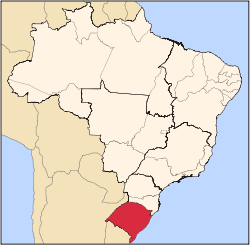Ibarama | |
|---|---|
 Location within Rio Grande do Sul | |
| Coordinates: 29°25′S53°08′W / 29.417°S 53.133°W | |
| Country | |
| State | Rio Grande do Sul |
| Population (2020 [1] ) | |
• Total | 4,399 |
| Time zone | UTC−3 (BRT) |
Ibarama is a municipality in the state of Rio Grande do Sul, Brazil.
The municipality contains part of the 1,848 hectares (4,570 acres) Quarta Colônia State Park, created in 2005. [2] The municipality is partly flooded by the reservoir of the Dona Francisca Hydroelectric Plant on the upper Jacuí River. [3]



